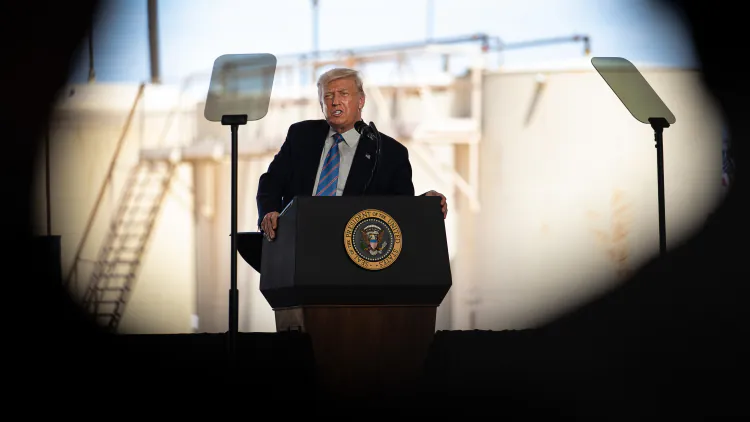Trump Flaunts His Corruption
The former president’s shakedown of oil executives may not have been illegal, but it is undeniably scandalous.

One of the few ways in which Donald Trump has improved American politics is in making explicit what was once veiled in implication or euphemism. During the 2016 election, for example, he said what everyone knew but no politicians would acknowledge: That wealthy donors bought access and fealty with their contributions.
These blunt statements have endeared him to supporters who see Trump as a rare figure willing to speak about how special interests and corporations conspire with politicians to screw over ordinary Americans. And because he is a billionaire, they see him as immune to these pressures, wealthy enough to not be beholden in the same way as typical politicians.
That brings us to a Washington Post article this morning. At a Mar-a-Lago meeting in April, oil executives complained that despite pouring hundreds of millions into lobbying the government, the Biden administration had pursued stronger environmental regulations. “Trump’s response stunned several of the executives in the room overlooking the ocean: You all are wealthy enough, he said, that you should raise $1 billion to return me to the White House,” the Post reports. In exchange, Trump vowed to roll back current regulations and freeze future ones. He told them that, given the savings, a billion bucks would be a “deal” for them.
[David A. Graham: The utter absurdity of Donald Trump and RFK Jr. running as “outsiders”]
What Trump was offering is entirely legal and absolutely corrupt. (Or to borrow a phrase: very legal and very uncool.) Thanks to Trump’s bluntness, there can be no hair-splitting about what’s going on here, and that’s good for public understanding. Trump asked special interests for an eye-popping fee in exchange explicit favors. Trump and the oil companies might argue (dubiously) that their preferred regime would actually be better for consumers, but they are cutting “the people” out of the discussion entirely, subverting democracy. The deal is getting done between Trump and the suits, behind closed doors. It’s a good reminder that Trump’s claim to being an outsider is a sham.
American politics would be healthier if all politicians were so transparent about such deals (though, of course, it would be better were they not making such deals at all). Everyone might “know” that politicians are cutting deals for powerful interests, but they seldom know what exactly those deals are, so it’s hard for them to take it into account when voting. (This is one reason the federal indictment of Senator Bob Menendez, the New Jersey Democrat, is so riveting: The alleged trades are all laid out so plainly.)
Trump, however, has said he’s different. Many people took his frankness about how the system works to mean that he wouldn’t act the same way as the politicians he excoriated. What this report shows is that he’s no different. Trump was describing transactionalism, not critiquing it, and the idea that Donald Trump would ever object to transactionalism is absurd. He’s a grandee in good standing of the Leopards Eating Faces Party.
[David A. Graham: Bob Menendez never should have been a senator this long in the first place]
In fact, he’s arguably worse. An ordinary politician might have approached this situation with a touch more finesse. First, he’d listen to the executives’ concerns. Then, he’d lay out his agenda on energy. Finally, a campaign aide would hit the executives up for donations. That offers a little bit of deniability, which in turns gives a politician in office some wiggle room. It’s not like donors can call him up and say, You made an explicit promise to do this for me! That would be unseemly. If the oil suits produce $1 billion and Trump wins, however, they can do exactly that, since he’s offered an explicit quid pro quo. Not only is he just as beholden to special interests as anyone else, here he’s going out of his way to make himself beholden.
One final tawdry thing about Trump’s offer is the implicit threat it contains. If they don’t pass the hat to produce the cash, Trump might not pursue the same policies—and, as he notes, that could cost them dearly.
[Tim Naftali: The worst president in history]
Trump runs a real risk to his reputation, as well as his election, by being quite so direct about what he’s offering. One of the biggest scandals in American political history was Teapot Dome, which involved federal officials trading favors to the oil business in exchange for cash. It’s one reason that Warren Harding, the president at the time, has often been ranked among the very worst by historians. (Trump has surpassed him in some recent surveys thanks to his attempt to steal the 2020 election.)
Voters just don’t like corruption very much, and Trump’s offer here is not only plainly corrupt but cuts to the center of the political persona he has cultivated. Trump is a bold truth-teller sometimes about the system, but seldom about himself.
What's Your Reaction?




















